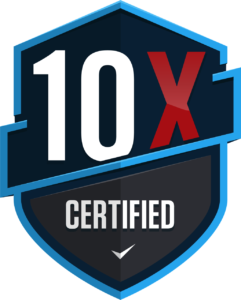In today’s dynamic business world, small business owners often face a myriad of challenges and opportunities. Small business coaching has emerged as a vital source of guidance and support in this environment. This specialized professional service empowers entrepreneurs by partnering them with experienced business coaches. Through a structured business coaching program, these coaches help develop essential skills, strategies, and systems tailored for small business success.
This guide aims to clarify small business coaching for entrepreneurs, whether they’re just starting out or looking to expand an established business. It will cover the benefits of coaching, how to choose the right business coach, and the significant role coaching can play in business growth and personal development. Embark on a journey to discover how small business coaching, backed by years of positive outcomes, can help you achieve your business goals and succeed in the competitive business arena.

What is Small Business Coaching
Small business coaching is a tailored service designed to support and enhance the growth of small businesses. It involves one-on-one coaching sessions where an experienced business coach collaborates with a small business owner.
Together, they focus on a range of areas such as strategic planning, employee management, cash flow analysis, and leadership skills development. Unlike generic business advice, this type of coaching is personalized, taking into account the unique challenges and opportunities of each business.
Distinction from Other Types of Coaching
While small business coaching may seem similar to other coaching forms like life coaching or executive coaching, there are distinct differences. Life coaching often addresses broader personal goals and challenges, whereas executive coaching is typically targeted at high-level corporate leaders focusing on organizational leadership and performance.
In contrast, this coaching is specifically tailored to the needs of small business owners, addressing both the personal and professional challenges they face in their business journey.
The role of a Small Business Coach
A small business coach acts as a mentor, advisor, and strategist. Their role is to help business owners identify their business goals, develop actionable strategies to achieve them, and provide support and accountability throughout the process. They are part listener, part motivator, and part consultant, bringing a fresh perspective to the business.
Responsibilities and Objectives
The primary responsibilities of a small business coach include:
- Helping business owners clarify their vision for their business and align it with their personal goals.
- Creating a road map for business growth and success.
- Identifying and addressing specific business challenges.
- Facilitating the development of key business skills.
- Providing unbiased feedback and encouragement.
The Importance of Coaching for Small Businesses
Small business coaching has proven to be vital in driving business success. Statistics and case studies have consistently demonstrated its impact:
- A study showed that businesses that engaged in coaching saw an average increase in revenue growth.
- This coaching has been linked to improved decision-making skills and increased confidence among business owners.
- Case studies of successful business owners often highlight the role of coaching in navigating critical business transitions and achieving significant milestones.
In essence, this offers a blend of professional guidance, strategic planning, and personal mentorship, tailored to the unique needs of the small business owner. It’s not just about surviving in the business world but thriving, adapting, and growing in a way that aligns with both the vision for the business and the entrepreneur’s personal aspirations.
The Benefits of Small Business Coaching
Small business coaching provides a multitude of advantages that can reshape the trajectory of a small business. From crafting bespoke business strategies to honing leadership skills, the benefits are vast and varied. Let’s delve into some of these key benefits:
Personalized Business Strategies
One of the most significant benefits is the development of personalized business strategies. Unlike one-size-fits-all solutions, a small business coach takes the time to understand the intricacies of your business and tailors strategies that suit your specific needs and goals. This customization ensures that the strategies are not only effective but also align with your vision for your business.
Enhanced Leadership and Management Skills
Leadership is at the heart of every successful business. This helps business owners refine their leadership and management skills. This includes learning how to motivate and manage teams effectively, developing a strong business culture, and enhancing communication skills. Improved leadership leads to a more cohesive and productive team, ultimately benefiting the entire organization.
Improved Decision-Making Process
Decision-making is critical in the fast-paced world of small business. A small business coach helps in sharpening your decision-making skills, ensuring that you make informed, strategic decisions that benefit your business. Coaches provide tools and frameworks to evaluate options, assess risks, and make decisions that align with both short-term needs and long-term business goals.
Increased Productivity and Efficiency
This can lead to significant improvements in productivity and efficiency within your business. Coaches help identify areas where processes can be streamlined, where time is being lost, and how to optimize operations. This can include advice on time management, employee management, and operational efficiencies.
Real-World Examples of Successful Coaching Outcomes
The true value of small business coaching is best understood through real-world examples. Here are a few:
- A small retail business struggling with cash flow improved its financial health dramatically within months of coaching, leading to an expansion of their store.
- A service-based small business owner, overwhelmed with workload, learned delegation and team management skills through coaching, leading to a better work-life balance and business growth.
- A tech startup, initially struggling with market positioning, worked with a coach to refine their business model and marketing strategy, resulting in increased market share and revenue growth.
These examples underscore the transformative impact small business coaching can have. It’s not just about business growth; it’s about building a sustainable, efficient, and fulfilling business that aligns with your personal and professional aspirations.
Whether you’re struggling with the early stages of your business or looking to take your established small business to new heights, the right coaching relationship can be a game-changer.

When Do You Need a Small Business Coach?
Recognizing the right time to seek a small business coach can be pivotal for your business’s success. Understanding the common challenges faced by small businesses and the signs that indicate the need for coaching can guide you in making this decision. Here’s how to identify when it might be time to consider coaching for your small business:
Identifying the Need for Coaching
The need for coaching often becomes apparent when you’re facing obstacles that seem insurmountable or when your business is not reaching its full potential. This could be a period of stagnant growth, difficulties in managing cash flow, challenges in team management, or even when you’re feeling overwhelmed by the responsibilities of running your business.
Common Challenges Faced by Small Businesses
- Small businesses commonly face a range of challenges including:
- Difficulty in scaling up operations.
- Struggles with effective marketing and reaching the target audience.
- Challenges in managing finances and cash flow.
- Issues with employee recruitment, retention, and management.
- Navigating the complexities of business strategy and planning.
Signs That Your Business Could Benefit from a Coach
Several signs suggest your business could benefit from a coach:
- Feeling overwhelmed or constantly stressed about your business.
- Uncertainty about the direction your business should take.
- Consistent problems that don’t seem to have clear solutions.
- A noticeable plateau in business growth or profits.
- Difficulty in managing time and prioritizing business tasks.
Choosing the Right Small Business Coach
Selecting the right business coach is crucial for achieving your desired outcomes in your business coaching program. It’s about finding someone whose expertise aligns with your business needs and whose approach resonates with your style. Here’s a guide to help you in this important decision-making process:
Key Qualities to Look for in a Coach
Expertise and Experience: Look for a coach with a proven track record in small business coaching. They should have experience in dealing with businesses similar to yours in size and industry.
Strong Communication Skills: A good coach should be an excellent communicator, capable of explaining complex ideas clearly and listening to your concerns.
Problem-Solving Abilities: The ability to quickly identify problems and suggest practical solutions is essential in a small business coach.
Empathy and Understanding: They should be able to relate to your challenges and show genuine interest in helping you and your business succeed.
Accountability and Motivation: A coach should hold you accountable for your goals and keep you motivated throughout your journey.
The Process of Finding and Selecting a Coach
Research: Start by researching potential coaches. Look at their websites, read reviews, and check their social media presence.
Recommendations: Ask other business owners for recommendations. Personal referrals can often lead to finding a coach who has been proven effective.
Check Credentials and Experience: Ensure the coach has relevant qualifications and experience. Look for any certifications in coaching or a background in business management.
Initial Consultation: Many coaches offer a free consultation call. Use this opportunity to gauge their compatibility with your needs and expectations.
What to Expect in a Coaching Relationship
Structure of Sessions: Coaching sessions can vary in structure, but they generally include regular meetings (either in-person or virtual), where you discuss progress, obstacles, and strategies.
Communication: Expect open and ongoing communication. A good coach will be accessible and responsive, providing guidance when needed.
Goal Setting: Your coach will help you set realistic and achievable business goals. They will then work with you to develop strategies to meet these goals.
Feedback and Evaluation: A coaching relationship involves continuous feedback and evaluation. Expect your coach to provide honest feedback and to help you measure your progress.
Recommendations, Credentials, Experience
- When reviewing potential coaches, look for someone with a combination of formal training in coaching and real-world business experience.
- Check for any relevant industry associations or credentials they hold. This can include membership in coaching organizations or business networks.
- Experience should be a mix of coaching hours and direct business experience, which can be invaluable in understanding the nuances of running a small business.
Choosing the right small business coach involves a blend of research, instinct, and a clear understanding of your business needs. The right coach should not only have the expertise and experience but also be someone with whom you can build a trusting and productive relationship. This relationship is a partnership – one that is integral to the growth and success of your small business.

Maximizing the Impact of Small Business Coaching
To fully benefit from this, it’s essential to approach the process with a clear strategy and an open mind. Here’s how you can maximize the impact of your coaching experience:
Setting Clear Goals and Expectations
- Define Specific Objectives: Start by setting clear, specific, and achievable goals for your business. What do you want to accomplish through coaching? It could be increasing revenue, expanding the customer base, improving leadership skills, or enhancing operational efficiency.
- Align Expectations with Your Coach: Ensure that your coach understands your business vision and goals. This alignment helps in developing a focused and effective coaching plan.
- Create a Roadmap: Work with your coach to develop a roadmap for achieving your goals. This should include milestones and timelines to track progress.
Being Open to Feedback and Change
- Embrace Constructive Feedback: Be prepared to receive honest feedback about yourself and your business. A coach’s insights, although sometimes challenging to hear, are valuable for growth.
- Adaptability: Be willing to adapt and make changes based on the coach’s suggestions. This may involve stepping out of your comfort zone and trying new strategies or approaches.
- Continuous Learning: View coaching as a learning process. Be open to acquiring new skills and knowledge that can help you run your business more effectively.
Measuring the Effectiveness of Coaching
- Track Progress Against Goals: Regularly review your goals and assess your progress towards them. This helps in understanding the effectiveness of the coaching.
- Feedback Loops: Establish regular feedback sessions with your coach to discuss what is working and what isn’t. This can lead to course corrections and more tailored advice.
- Quantitative and Qualitative Measures: Use both quantitative metrics (like revenue growth, customer acquisition costs) and qualitative feedback (employee satisfaction, personal confidence) to measure success.
Long-Term Strategies for Maintaining Growth and Applying Coaching Lessons
- Develop a Growth Mindset: Use the insights and skills gained from coaching to foster a growth mindset in your business. This involves continually seeking improvement and being open to new opportunities.
- Implement and Refine: Continuously implement the strategies and lessons learned from coaching. Be prepared to refine these strategies as your business evolves.
- Sustainability Planning: Work with your coach to create a long-term plan for sustaining growth. This includes succession planning, scaling strategies, and developing a strong leadership team.
- Build a Support Network: Leverage relationships and networks you’ve built through coaching. Engage with other business owners, industry groups, and mentors for ongoing support and advice.
Remember, maximizing the impact of small business coaching is not just about short-term gains but about embedding lasting changes and strategies that propel your business forward in the long run. It’s a collaborative journey that requires commitment, openness to change, and a focus on continuous improvement.
Common Misconceptions About Small Business Coaching
This is often surrounded by misconceptions that can deter business owners from seeking this valuable resource. Let’s address and debunk some of these prevalent myths, using real-life examples to illustrate the reality:
Myth 1: Coaching is Only for Businesses That Are Struggling
Reality: Coaching is beneficial for businesses at any stage – whether they are facing challenges, looking to grow, or simply aiming to maintain their success. For instance, a thriving e-commerce business sought coaching to explore new markets. The result was a successful expansion into international markets, something the owner hadn’t considered feasible before coaching.
Myth 2: Small Business Coaching is Too Expensive
Reality: The cost of coaching should be viewed as an investment in your business’s future. Many coaches offer flexible plans to suit different budgets. Additionally, the ROI from coaching often outweighs the initial cost. A small cafe owner, initially hesitant about the cost, invested in coaching and saw a 40% increase in profits within six months due to improved operations and marketing strategies.
Myth 3: Coaches Provide Instant Solutions to Problems
Reality: Coaches help you develop strategies and tools to address your business challenges, but they don’t offer instant fixes. It’s about empowering you with the skills to make better business decisions. For example, a local bookstore owner didn’t see immediate results but, with consistent application of the strategies discussed in coaching sessions, eventually turned their business around by increasing sales and customer engagement.
Myth 4: Coaching is Just Another Form of Consulting
Reality: Unlike consultants who often provide solutions and do the work for you, coaches guide you to create your own solutions. They help develop your skills and knowledge so you can run your business more effectively. A tech startup owner learned through coaching how to strategically plan and execute business operations, leading to sustainable business growth.
Myth 5: A Business Coach Will Take Control Over My Business
Reality: A coach’s role is to advise and guide, not to take control. The decisions and direction of the business always remain in the hands of the business owner. A successful business owner in the fashion industry emphasized how coaching helped her take more control over her business by improving her decision-making and leadership skills.

Throughout this guide, we’ve explored the multifaceted world of small business coaching, delving into its definition, benefits, and transformative impact on business owners and their ventures. Small business coaching is not merely a service; it’s a strategic catalyst for growth, empowering entrepreneurs to navigate business complexities, overcome challenges, and realize their aspirations.
Consider this as a key element of your growth strategy. Whether facing hurdles, aiming for higher success, or just starting out, coaching could be your gateway to unlocking potential and driving sustainable growth.
For those ready to take this significant step, remember, that the right coaching relationship can make all the difference. If you’re looking to explore coaching options, we at Business Coach Denver offer tailored business coaching services. Reach out to us for guidance tailored to your unique business needs.
Embrace this opportunity to elevate your business and start on a path of continuous learning, growth, and success with the support of a seasoned coach by your side.
FAQs
What exactly does a small business coach do?
A small business coach provides guidance, support, and accountability to help business owners identify and achieve their business goals. They work on developing strategies, enhancing leadership skills, improving decision-making, and overall business growth. Unlike consultants who may do the work for you, coaches help you develop the skills to do the work yourself.
How long does a typical small business coaching relationship last?
The duration varies based on individual needs and goals. Some business owners may only need a few months of coaching, while others might engage with a coach for several years. The key is to continue as long as the coaching relationship is providing value and helping achieve set goals.
Is small business coaching only for businesses that are struggling?
No, coaching is beneficial for businesses at any stage. While struggling businesses can turn things around with coaching, successful businesses can also use coaching to maintain their success, scale up, or tackle new challenges.
How do I know if a business coach is right for me and my business?
Look for a coach with experience relevant to your industry and business size. During initial consultations, assess if their coaching style aligns with your preferences and needs. Also, consider their past success stories and whether their clients had similar challenges to yours.
Can small business coaching help with specific areas such as marketing or financial planning?
Absolutely. Many small business coaches specialize in specific business areas like marketing, finance, or operations. Make sure to choose a coach who has expertise in the areas where you need the most help.
How often do I meet with a small business coach?
This varies based on your needs and the coach’s approach. Some coaches meet with clients weekly, while others may have bi-weekly or monthly sessions. The frequency can also change over time as your business evolves.
What’s the difference between coaching and mentoring?
Coaching is a structured process focused on specific goals and outcomes, often with a more formal arrangement and methodology. Mentoring is usually a more informal relationship, focused on long-term career and personal development.
Can a small business coach help with personal challenges related to business ownership?
Yes, many small business coaches address the personal aspects of business ownership, such as work-life balance, stress management, and personal goal setting, recognizing that these directly impact business success.
Is there a guarantee that my business will grow after coaching?
While there’s no absolute guarantee, coaching has been shown to significantly aid business growth and success. The effectiveness depends on both the quality of the coaching and your willingness to implement strategies and make necessary changes.
How much does small business coaching typically cost?
Costs vary widely based on the coach’s experience, the scope of services, and the duration of the coaching relationship. Some coaches charge by the session, while others may have packages or monthly rates.

